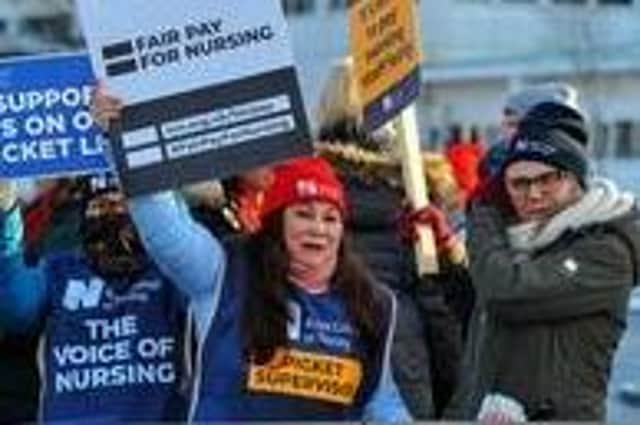Robin Swann warns of £1bn black hole in Northern Ireland's health budget for next year


The freshly reappointed health minister outlined his department's bleak funding picture as he called on the UK government to provide assurances that money it has offered to settle outstanding pay demands of health and other public sector workers this year will be provided on a recurrent basis to sustain the pay uplifts in future years.
Mr Swann said unless there is a guarantee of recurring funding for pay going forward, through changes to how Northern Ireland's Treasury grant is calculated, his department will not have the money to maintain those pay rates in 2024/25, never mind make further awards in years to come.
Advertisement
Hide AdAdvertisement
Hide AdThe minister also said he was currently engaging with unions and the wider workforce in an effort to prevent further industrial action pending confirmation of the outstanding pay settlement for this current year.
He said he has also commissioned an initiative to identify potential efficiency savings at managerial and back-office level to help free up resources to progress stalled reforms of health and social care delivery in Northern Ireland to address systemic issues, including the UK's longest waiting lists.
The government offered the executive a £3.3 billion package to support the return of power-sharing – a pot that included hundreds of millions of pounds to settle 2023/24 public sector pay demands.
Mr Swann said the £1 billion deficit projection for his department was based on another flat-cash budget in 2024/25 – an allocation in line with this year's budget, without any increase to account for inflation – and the absence of further government support for sustaining pay awards.
Advertisement
Hide AdAdvertisement
Hide AdStormont officials have been grappling with the consequences of a flat cash/standstill allocation this year as a result of a 23/24 budget set by Northern Ireland Secretary Chris Heaton-Harris.
Ministers in the newly restored executive will have responsibility for setting the coming budget and Mr Swann expressed confidence that they will collectively agree to give more money to health.
On the government's financial package, he added: “The understanding coming from the pay package is there will be enough to meet those pay settlements within this last year, which is 23/24.
“But there's no surety in regards to that financial package actually next year and the ongoing year.
Advertisement
Hide AdAdvertisement
Hide Ad“So the pay awards that we give this year, that recurrent support hasn't been added to the baseline yet, so I'm currently looking within the Department of Health of almost a gap, if everything stays the same, if we only get a flat cash budget, which I don't expect us to, the pressures could be upwards towards a £1 billion shortfall in regards to meeting the increase on the pay that we've already given this year, carrying over to next year and then the expectation of a further pay increase as well, plus the other additional pressures (increased energy costs and other inflationary pressures).”
He added: “So that's why I think there is a real collective effort across all the executive parties to make sure that the financial package is actually correct.”
This week the Northern Ireland Children's Hospice, which provides specialist palliative care for more than 350 babies, children and their families every year, said that it would have to reduce some services due to a “loss of government funding”.
The charity has also said it is facing financial challenges due to the cost-of-living crisis.
Advertisement
Hide AdAdvertisement
Hide AdMr Swann has asked officials to look “urgently” at the planned bed cuts to determine the best way forward.
The minister said it was an example of the many important services that are struggling with resources.
He said he needed to be “open and honest” in regard to the current financial pressures facing his department.
“We will not be able to do everything that we want to do, nor will we be able to do everything that other politicians expect us to do because of those financial constraints,” he added.
Advertisement
Hide AdAdvertisement
Hide AdThe minister said he has received assurances from other executive colleagues that health will be prioritised in the new Stormont administration.
“I got that sense, and that's one of the reasons we took that post, one of the reasons my party took this post was actually in regards to the commitments that were being made by other parties actually to make sure that health was properly recognised and resourced,” he said.
He added: “There will be competing bids within the executive. But I think there is a genuine will across all the parties to make sure that there is the recognition of health and what it actually needs in regards to the pay settlements and the finance that it needs to actually counter those 10 to 12 years of austerity that we've had to endure, especially in health, in regards to how you have actually had a deficit in our funding pot when it comes to core services.”
Mr Swann said the efficiency review he had commissioned will be undertaken by UK-wide NHS advisory body Getting It Right First Time (GIRFT).
Advertisement
Hide AdAdvertisement
Hide Ad“So it's not just about us going and asking for money, it's us actually making sure that everything we're doing is running as efficient and cost-effective as we possibly can as well, something that we haven't done before,” he said.
“So we'll make sure that we're getting our own house in order too.”